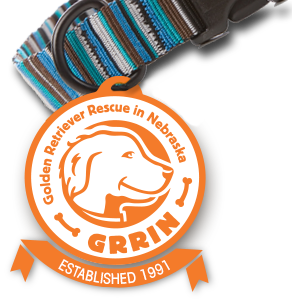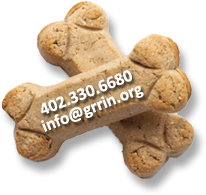Adoption Questions
What should I know about Golden Retrievers before I consider adoption?
Most Golden Retrievers believe life is one big party and they are the guests of honor. Goldens will invite almost everyone they meet to this bash. They are very social and companionable. They do not make good protection or guard dogs because they are so trusting of people. They are also sporting dogs with a high energy level. Males weigh up to 75-85 pounds and females up to 70 pounds depending on height. Once or twice a year, they shed substantially, as they are a double-coated dog with a soft undercoat beneath their water-repellant outer coat. Regular brushing is recommended. If your family has an allergy problem or your lifestyle requires uncompromising housekeeping, a non-shedding breed may be more suitable.
Golden Retrievers are quite intelligent, which is why they are used as guide dogs and assistance dogs. It also means you must train the dog to be a well-mannered family member. Some of our rescue dogs have already received basic obedience training. However, it is good to repeat this so that you can communicate with your dog.
Goldens are known for their affectionate temperament and must live in your home. They do not make good kennel dogs, and if this is your plan, you would do well to seek a breed that is less devoted to family life.
How much does it cost to adopt and keep a Golden?
The cost to our program to rescue a healthy Golden can be well over $500. We send each dog to their new home with vaccinations updated, spayed/neutered (if health and age allow) and microchipped. While in foster care, the Golden has received a health check-up including heartworm and fecal testing, collar, a GRRIN identification tag, and has been on monthly heartworm preventative. Our adoption fee of $500 ($200 for senior dogs 8 and older), effective June 1, 2023 is due at the time adoption contracts are signed, and it includes the annual membership dues for one applicant. All adoption fees are used to assist in the rescue of other Goldens.
GRRIN estimates that it costs about $1500 per year to feed and care for a dog the size of a Golden Retriever. Dogs need a healthy diet, veterinary care, annual inoculations and licensing. Other expenses include a leash, collar, brush, bowls, toys, grooming and boarding for vacations.
What age Golden is right for me?
Golden puppies are unequalled for cuteness. They are friendly, curious, energetic and mischievous. They need housetraining, constant supervision, obedience training, and socialization with kids, adults and other dogs. They need to be taught car travel, walking on a leash, and household rules. They go through periods of chewing in which they can destroy furniture in a matter of minutes. Do you have the kind of lifestyle that will allow you to train and supervise a puppy for three years? Yes, three years. Goldens mature slowly. Even after they are physically full-grown, they will go through periods of adolescent “rebellion” until approximately 3 years of age.
If you have a young and active family, we suggest a Golden in the 2- to 5-year range. Remember, the Golden was originally bred to jump into icy water to retrieve ducks, and to do this all day long. Okay, your family doesn’t hunt ducks but that energy has to go somewhere. It takes an energetic owner to keep up with a Golden youngster.
If your lifestyle is to relax after work, perhaps with a walk, watching TV and settling in for the evening, a Golden in the 3- to 6-year range may be a better choice for you. Adult Goldens are energetic and love to play. They quickly bond to a new owner and can give you many years of companionship.
Consider adopting a senior Golden. Goldens are so people-oriented that they bond at any age. They maintain their love of play and companionship throughout their lives. Seniors enjoy walks and toys and people. They also enjoy napping in a sunny spot, snuggling, or lying at your feet so they can be close to you. All our Goldens are examined by a veterinarian for general health. We tell you everything we know about the dog. With a senior Golden, you can expect a special and close relationship that may last for years. People who have adopted seniors tell us these dogs seem especially grateful for the love, care, play and respect they receive in new homes.
We are listing some very general trends, but advise you that an individual dog’s personality has a great influence on his or her activity level and life span.
Gender: male or female Golden?
Some breeds of dogs have distinct differences in personality between male and female dog. There is simply too much individual variation in Goldens to make sweeping generalizations based on the sex of the dog. You may be thinking of requesting a male or female dog because you’ve been told that one sex of dog is more affectionate or independent than the opposite sex. This is not the case with Goldens. Both genders want lots of physical attention. Dogs of either gender can be independent, silly, dignified or sloppy in their need for affection. We suggest you identify the personality traits you value in a companion dog and ask if such a dog is available for adoption. Our best matches of dogs and adopters are based on temperament rather than sex.
How do I apply to adopt a Golden?
Prospective owners are carefully screened before they are allowed to adopt a dog. Applications require a phone interview and home visit. GRRIN requires that prospective owners have a fenced yard with the fence attached to the house. The screening process covers past history with pets, willingness to crate-train and attend obedience classes, ages of children, family schedule, facilities for housing a Golden, and the dog’s primary function in the family such as hunter, child’s playmate, or companion for an older person. Adoptions are followed up by calls and visits from GRRIN volunteers, and all necessary assistance is given to help the adoptive family and rescued dog adjust to one another. We want every GRRIN dog to remain with their “furever” family.
How do I meet available dogs?
Once your application is approved and our Adoption Coordinator calls to advise you that there is a potential Golden companion for you, the foster home will call you to schedule a time to meet the Golden at their home. In order to avoid stress to the dog, we will not transport the Golden to your home. We ask that you be on time for this appointment and plan to spend a minimum of one hour at the foster home.
What if the adoption doesn’t work out?
This circumstance is rare since our screening process is extensive. But it does happen. If at any time you cannot keep your rescue dog, it must come back to GRRIN as stipulated in the adoption contract. We stand behind every Golden we place … for the life of the dog. We want to hear from you if you have questions, problems or want to brag about your new Golden family member. To that end, GRRIN maintains a voice-mail telephone line. Dial 402.330.6680 and leave a message. A volunteer will contact you.
Should I obedience train my adopted dog?
Yes! Yes! They thrive on obedience training. Besides, a Golden Retriever is a big dog. Training should begin right away and be an ongoing process. All Goldens are trainable and actually enjoy the learning process. Training creates a bond between you and your dog and will make your Golden a good canine citizen. It is a good idea to repeat obedience training programs to reinforce commands and facilitate your communication with your dog.
Can I breed my adopted Golden?
No. The very need for Golden Retriever Rescue in Nebraska is the best reason not to breed. There is an over-population problem. Goldens who enter the GRRIN program are spayed or neutered if age and health allow. AKC registration papers are not transferred to the adoptive owner.

